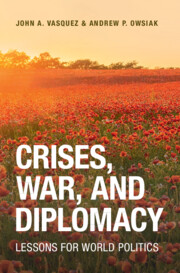Book contents
- Crises, War, and Diplomacy
- Crises, War, and Diplomacy
- Copyright page
- Dedication
- Contents
- Tables
- Text Boxes
- Preface
- Acknowledgments
- Part I Foundations
- Part II The Post-Napoleonic Nineteenth Century
- Part III The Twentieth Century through World War II
- Part IV The Nuclear Era
- 12 The Berlin Crises
- 13 The Cuban Missile Crisis
- 14 The 1971–1973 Cod War
- 15 The Crimea Annexation and the Russia–Ukraine War
- Part V Conclusion
- Methodolocial Appendix
- References
- Name Index
- Subject Index
13 - The Cuban Missile Crisis
from Part IV - The Nuclear Era
Published online by Cambridge University Press: 07 November 2025
- Crises, War, and Diplomacy
- Crises, War, and Diplomacy
- Copyright page
- Dedication
- Contents
- Tables
- Text Boxes
- Preface
- Acknowledgments
- Part I Foundations
- Part II The Post-Napoleonic Nineteenth Century
- Part III The Twentieth Century through World War II
- Part IV The Nuclear Era
- 12 The Berlin Crises
- 13 The Cuban Missile Crisis
- 14 The 1971–1973 Cod War
- 15 The Crimea Annexation and the Russia–Ukraine War
- Part V Conclusion
- Methodolocial Appendix
- References
- Name Index
- Subject Index
Summary
The world came closest to nuclear war during the Cuban Missile Crisis. We find that there existed two paths by which nuclear war might have occurred. The first path involves unrestrained hard-liners. Nuclear weapons did not deter some actors from proposing escalatory actions, including the use of nuclear weapons. Luckily, both Kennedy and Khrushchev reined in their respective hard-liners. Along the second path, situations – not known at the time – could have led to an initial use of nuclear weapons, after which events might have spiraled out of control. The US, for example, did not know that the Soviets had placed tactical nuclear weapons in Cuba. If the US had tried to invade Cuba to topple Castro – as some people advocated – then the Soviets might have used the weapons. Ultimately, Kennedy successfully used a quarantine and threatened force to compel the Soviets to withdraw their missiles from Cuba. The threat of nuclear war lingered behind these actions. In the end, however, the crisis ended not because of nuclear deterrence but rather because both sides reached a mutually acceptable bargain. Kennedy promised not to invade Cuba and to remove US missiles from Turkey; Khrushchev, meanwhile, agreed to remove Soviet missiles from Cuba.
Keywords
Information
- Type
- Chapter
- Information
- Crises, War, and DiplomacyLessons for World Politics, pp. 270 - 301Publisher: Cambridge University PressPrint publication year: 2025
Accessibility standard: Inaccessible, or known limited accessibility
Why this information is here
This section outlines the accessibility features of this content - including support for screen readers, full keyboard navigation and high-contrast display options. This may not be relevant for you.Accessibility Information
Content Navigation
Allows you to navigate directly to chapters, sections, or non‐text items through a linked table of contents, reducing the need for extensive scrolling.
Provides an interactive index, letting you go straight to where a term or subject appears in the text without manual searching.
Reading Order & Textual Equivalents
You will encounter all content (including footnotes, captions, etc.) in a clear, sequential flow, making it easier to follow with assistive tools like screen readers.
Structural and Technical Features
You gain clarity from ARIA (Accessible Rich Internet Applications) roles and attributes, as they help assistive technologies interpret how each part of the content functions.
